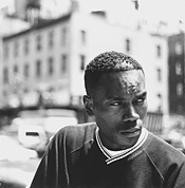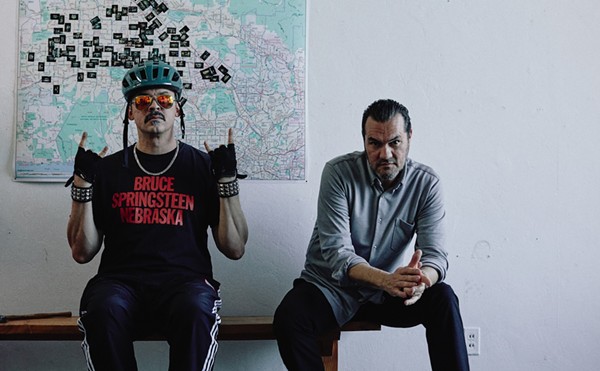"When I'm with the X-ecutioners, I'm working with a team, basically trying to compromise and work together with three other guys, deal with the personalities and different desires that everyone has," Swift says. "Whereas, when you work as a solo artist, you work at your own pace. There's no one there to disagree with you -- and, as the X-ecutioners, what we're trying to do is express the fact that we're four artists who come together as a band. That's why we use four turntables. What I'm trying to do with this album is express my abilities as a musical artist, using the turntable to show people where I'm coming from as Rob Swift. When you're in a group, you can't necessarily do that."
The Ablist stands out simply because it's so accessible. While many scratch-happy DJs have a tendency to show off their skills and make melody and songs secondary, Swift pays close attention to songwriting. He still cuts it up (see the dizzying scratch workout on "Dope on Plastic"), but also mixes in jazzy horns on "Modern Day Music," a song on which guest rappers boast "turntablists enable this culture's continuation" while Swift squiggles away in the background. But the attention always comes back to Swift. Even the so-called a cappella version of "Dope on Plastic" that appears on the 12-inch version of the single has equal parts scratching and rapping. Swift isn't there just to provide the MC with beats -- he's calling the shots.
"For the first time I could show people that the turntable is a musical instrument," he explains. ""All that Scratching' is a perfect example, because it shows how the turntable interacts with the horn and the drum and guitar. It's like a fifth instrument. Some people don't want to hear you scratch at a thousand miles per hour. They want to hear music, so you have to scratch at a thousand miles per hour and provide music, too."
In addition, Swift gets to practice his skit-making skills on The Ablist. He delivers a clever narrative on "What Would You Do?", a song that collects a group of stories people told about how they would react to threats of violence. Because the track is a pastiche of other records, Swift cut-and-pasted the story (complete with the requisite samples of grunts culled from martial arts films) without having to write a word himself.
"That song is one of the dope songs on the album," Swift says. "We wanted to do a song that told a story without having to pick up a microphone and just show the different ways you can use a turntable. You don't have to always scratch at a thousand miles per hour. You can actually use it in more subtle ways. Dr. Butcher, who produced the song, had this record that asked, "What would you do?' and we built the whole story around that question."
Taught by his older brother, Swift started DJing when he was 12 years old, and the turntable gave him a way to avoid adopting the gangsta lifestyle. "DJing kept me off the streets," he says. "A lot of my friends would be hanging on the street corner and getting into trouble, and I'd be upstairs practicing cutting." By the time he was 19, Swift began competing in DJ battles. It was at that point that he says he learned how to control a crowd and earn the kind of respect he always wanted. He cites Herbie Hancock's "Rockit" (1983), a song that was equally rooted in jazz and hip-hop, as one of his early inspirations. In 1991, he placed third in the East Coast DMC Finals and in 1992 won the competition; by the mid-'90s, he had joined the X-ecutioners. At that time, DJs didn't get much respect, but that never deterred Swift.
"Turntablists have always known that, whether people accept what we are doing as an art form or not, we're still going to do it," he says. "At one point, it felt like we were being shunned by the industry, and a lot of people weren't bothering to give us opportunities to do albums and stuff like that. The most you'd see of a DJ is maybe hearing some scratches on a record. For the most part, it was all about the rappers, but we kept on with what we were doing. We stayed on our agenda, and after a while, people came around to see what we were trying to do and wanted to help expose it. Now, people like myself, Q-bert, and Mixmaster Mike are coming out with albums."
On a tour with Common last year, the X-ecutioners had the best of both worlds. The group opened for the rapper with one of its scratch-filled sets and then backed Common during his set. Swift himself works with several rappers on The Ablist and says he recognizes the pros and cons of doing so.
"In some ways, working with a rapper can be cool, because you get to travel and meet people and learn about the industry," he explains. "On the other hand, it can be kinda frustrating, because, as a DJ, you have to play in the back and do what you're asked to do and not necessarily what you want to -- because the rapper is the main focus -- so you have to work within his frame of thinking. There's a limit to how much scratching you can do and a limit to other things. For so long, it's been all about the MC, so it's about time the tables turned."













